动词ing形式的用法及练习题
ing 动词短语的用法
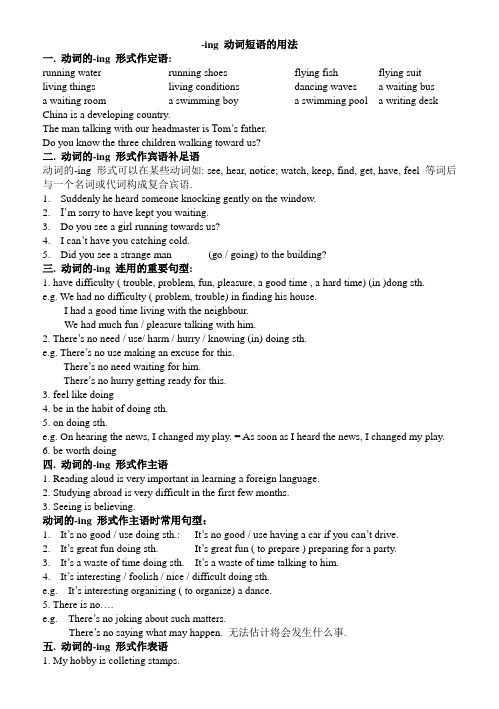
-ing 动词短语的用法一. 动词的-ing 形式作定语:running water running shoes flying fish flying suitliving things living conditions dancing waves a waiting busa waiting room a swimming boy a swimming pool a writing desk China is a developing country.The man talking with our headmaster is Tom’s father.Do you know the three children walking toward us?二. 动词的-ing 形式作宾语补足语动词的-ing 形式可以在某些动词如: see, hear, notice; watch, keep, find, get, have, feel 等词后与一个名词或代词构成复合宾语.1.Suddenly he heard someone knocking gently on the window.2.I’m sorry to have kept you waiting.3.Do you see a girl running towards us?4.I can’t have you catching cold.5.Did you see a strange man ______ (go / going) to the building?三. 动词的-ing 连用的重要句型:1. have difficulty ( trouble, problem, fun, pleasure, a good time , a hard time) (in )dong sth.e.g. We had no difficulty ( problem, trouble) in finding his house.I had a good time living with the neighbour.We had much fun / pleasure talking with him.2. There’s no need / use/ harm / hurry / knowing (in) doing sth.e.g. There’s no use making an excuse for this.There’s no need waiting for him.There’s no hurry getting ready for this.3. feel like doing4. be in the habit of doing sth.5. on doing sth.e.g. On hearing the news, I changed my play. = As soon as I heard the news, I changed my play.6. be worth doing四. 动词的-ing 形式作主语1. Reading aloud is very important in learning a foreign language.2. Studying abroad is very difficult in the first few months.3. Seeing is believing.动词的-ing 形式作主语时常用句型:1.It’s no good / use doing sth.: It’s no good / use having a car if you can’t drive.2.It’s great fun doing sth. It’s great fun ( to prepare ) preparing for a party.3.It’s a waste of time doing sth. It’s a waste of time talking to him.4.It’s interesting / foolish / nice / difficult doing sth.e.g. It’s interesting organizing ( to organize) a dance.5. There is no….e.g. There’s no joking about such matters.There’s no saying what may happen. 无法估计将会发生什么事.五. 动词的-ing 形式作表语1. My hobby is colleting stamps.2. The real problem is getting to know the needs of the students.注: 动词的-ing 形式和不定式都可以作主语或表语, 一般来说, 在表示抽象笼统的一般动作时多用动词的-ing 形式; 在表示具体某次动作,特别是将来的动作时, 多用不定式.如:1.Smoking is not allowed here.2.It isn’t good for you to smoke so much.3.My job is typing letters and papers.4.My job now is to type these letters and papers.六. 动词的-ing 形式作宾语:1. 只接动词的-ing 形式作宾语的动词和动词短语: finish, complete, suggest, avoid, stop, mind,enjoy, delay, practice, advise, consider, escape, miss, imagine, risk, prevent, appreciate, resist, keep on, give up, put off, get through, dislike, can’t help, burst into, succeed in; feel like; be fond of; keep on; stop ( prevent ) … from; be used to doing; spend … on; be interested in2. 两者都可以,但区别较大者:1)remember / forget / regret2)try3)mean4)like / prefer / hate / love (抽象、笼统与具体、特定)e.g. I hate speaking before a big audience. / I hate to say so, but I really ca n’t go.I love doing comedies. / I’d love to go to the cinema now.5)start / begin在以下三种情况下,只用不定式作宾语:a. 主语是物不是人:The weather began / started to get fine.b. start 和begin用于进行时:He’s beginning / starting to cook the dinner.c. 后跟表示情感、意念或思想的动词:I began / started to realize that I was wrong.6)stop 7)go on七.动词的-ing 形式作状语1. Arriving there, he made up his mind t go in.2. Not knowing her telephone number, I couldn’t get in touch with her.3. Helen was sitting by the window, reading a novel.4. His parents died, leaving him a lot of money.当动词的-ing 形式所表示的动作发生在谓语动作之前,应使用完成式,即:having done. 如:1.Having finished homework, he rushed out to play football.2.Having invited him to give us a talk, we’d better go to listen to him.3.Having been ill for a long time, he needed time to recover.动词的-ing 形式还有被动式,表示与句子的主语之间是被动关系。
动词ing形式单词练习题
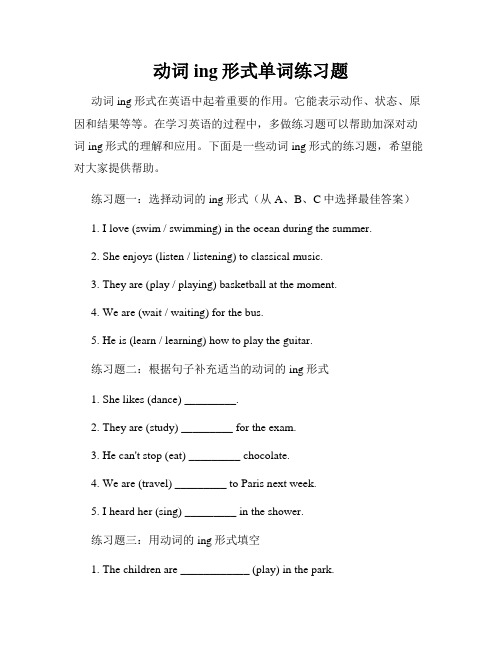
动词ing形式单词练习题动词ing形式在英语中起着重要的作用。
它能表示动作、状态、原因和结果等等。
在学习英语的过程中,多做练习题可以帮助加深对动词ing形式的理解和应用。
下面是一些动词ing形式的练习题,希望能对大家提供帮助。
练习题一:选择动词的ing形式(从A、B、C中选择最佳答案)1. I love (swim / swimming) in the ocean during the summer.2. She enjoys (listen / listening) to classical music.3. They are (play / playing) basketball at the moment.4. We are (wait / waiting) for the bus.5. He is (learn / learning) how to play the guitar.练习题二:根据句子补充适当的动词的ing形式1. She likes (dance) _________.2. They are (study) _________ for the exam.3. He can't stop (eat) _________ chocolate.4. We are (travel) _________ to Paris next week.5. I heard her (sing) _________ in the shower.练习题三:用动词的ing形式填空1. The children are ____________ (play) in the park.2. He enjoys ____________ (read) books in his free time.3. We were ____________ (watch) a movie when the power went out.4. They can't stop ____________ (talk) about their vacation.5. I saw them ____________ (dance) at the party last night.练习题四:将下列句子改写成动词的ing形式1. She takes a walk in the morning. --> She enjoys ____________ a walk in the morning.2. They played soccer yesterday. --> They had fun ____________ soccer yesterday.3. He writes songs in his spare time. --> He spends his spare time____________ songs.4. We watched a movie last night. --> We spent the evening____________ a movie.5. She cooks dinner for her family. --> She is responsible for____________ dinner for her family.练习题五:判断下列句子中的动词是否使用了正确的ing形式1. She goes to the gym every day. (正确/错误)2. They are going to swimming next weekend. (正确/错误)3. He likes play tennis. (正确/错误)4. We are waiting for the bus stop. (正确/错误)5. She enjoys to dance in her free time. (正确/错误)答案:练习题一:1. swimming 2. listening 3. playing 4. waiting 5. learning 练习题二:1. dancing 2. studying 3. eating 4. traveling 5. singing练习题三:1. playing 2. reading 3. watching 4. talking 5. dancing练习题四:1. taking 2. playing 3. writing 4. watching 5. cooking练习题五:1. 正确 2. 错误 3. 错误 4. 错误 5. 错误通过以上练习题,我们可以更好地理解和运用动词的ing形式。
动词ing 练习题
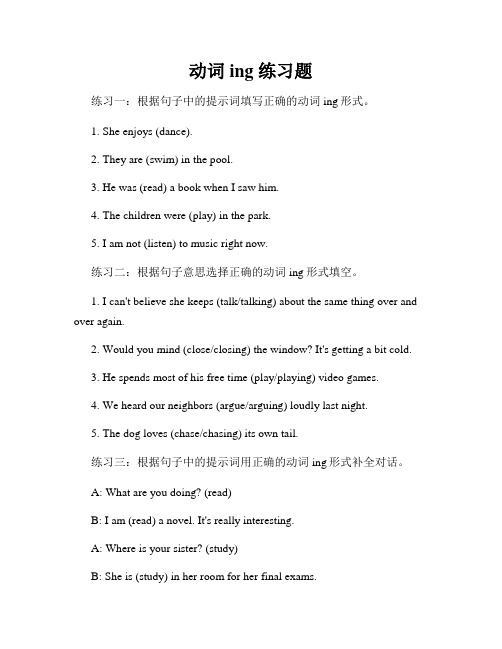
动词ing 练习题练习一:根据句子中的提示词填写正确的动词ing形式。
1. She enjoys (dance).2. They are (swim) in the pool.3. He was (read) a book when I saw him.4. The children were (play) in the park.5. I am not (listen) to music right now.练习二:根据句子意思选择正确的动词ing形式填空。
1. I can't believe she keeps (talk/talking) about the same thing over and over again.2. Would you mind (close/closing) the window? It's getting a bit cold.3. He spends most of his free time (play/playing) video games.4. We heard our neighbors (argue/arguing) loudly last night.5. The dog loves (chase/chasing) its own tail.练习三:根据句子中的提示词用正确的动词ing形式补全对话。
A: What are you doing? (read)B: I am (read) a novel. It's really interesting.A: Where is your sister? (study)B: She is (study) in her room for her final exams.A: Why is he so tired? (work)B: He has been (work) all day on his project.A: What were you doing yesterday? (watch)B: I was (watch) a movie with my friends.A: What are you planning to do this weekend? (travel)B: I am (travel) to the beach with my family.练习四:根据句子意思用适当的动词ing形式填空。
动词ing形式的用法及变化规则
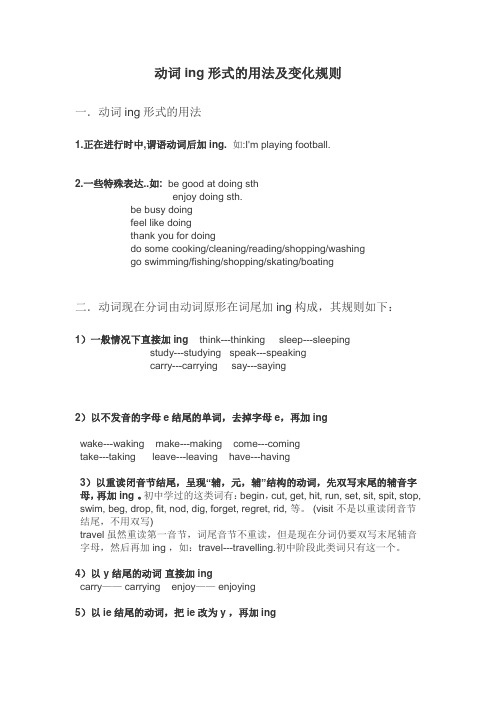
动词ing形式的用法及变化规则一.动词ing形式的用法1.正在进行时中,谓语动词后加ing. 如:I'm playing football.2.一些特殊表达..如: be good at doing sthenjoy doing sth.be busy doingfeel like doingthank you for doingdo some cooking/cleaning/reading/shopping/washinggo swimming/fishing/shopping/skating/boating二.动词现在分词由动词原形在词尾加ing构成,其规则如下:1)一般情况下直接加ing think---thinking sleep---sleepingstudy---studying speak---speakingcarry---carrying say---saying2)以不发音的字母e结尾的单词,去掉字母e,再加ingwake---waking make---making come---comingtake---taking leave---leaving have---having3)以重读闭音节结尾,呈现“辅,元,辅”结构的动词,先双写末尾的辅音字母,再加ing 。
初中学过的这类词有:begin,cut, get, hit, run, set, sit, spit, stop, swim, beg, drop, fit, nod, dig, forget, regret, rid, 等。
(visit 不是以重读闭音节结尾,不用双写)travel虽然重读第一音节,词尾音节不重读,但是现在分词仍要双写末尾辅音字母,然后再加ing ,如:travel---travelling.初中阶段此类词只有这一个。
4)以 y 结尾的动词直接加 ingcarry—— carrying enjoy—— enjoying5)以ie结尾的动词,把ie改为y ,再加ingdie---dying lie---lying要特别注意有些动词没有进行时态.1、表示状态、思想、感情和感觉的动词,如:see, hear, love, know, want, hope, think等,没有进行时态。
动词-ing形式(专项练习)(解析版)

动词-ing形式精准训练一、单选题1.I still remember to the Famen Temple and what I saw there.A.to takeB.to be takenC.takingD.being taken1. 【解析】 D 记得做过某事要用动词的-ing形式, I与take之间被动的关系, 所以D项正确。
2.There are hundreds of visitors _______ in front of the Art Gallery to have a look at Van Gogh’s paintings.A.waitedB.to waitC.waitingD.wait2.C【解析】本题考查现在分词作后置定语。
“正在等候的参观者”, 所以选C项。
3.Listen! Do you hear someone __________for help?A.callingB.callC.to callD.called3.A 【解析】该空所填内容在句中为非谓语动词作宾语补足语, 根据someone与call的主动关系判断, 排除D项。
hear后接不定式作宾语补足语时应省略to, 由此排除C项。
由listen可判断出此处表示有人正在求救, 可排除B项, 故选A项。
4.He had wonderful childhood, _____with his mother to all corners of the world.A.travelB.to travelC.traveledD.traveling4.D 【解析】主语(he)与动词travel之间存在主动关系, 故用traveling作伴随状语, 故选D。
5. at my classmates' faces, I read the same excitement in their eyes.A.LookingB.LookC.To lookD.Looked5. A 【解析】look与其逻辑主语I之间为主动关系, 因此用looking。
动词的 -ing形式与动词的搭配问题
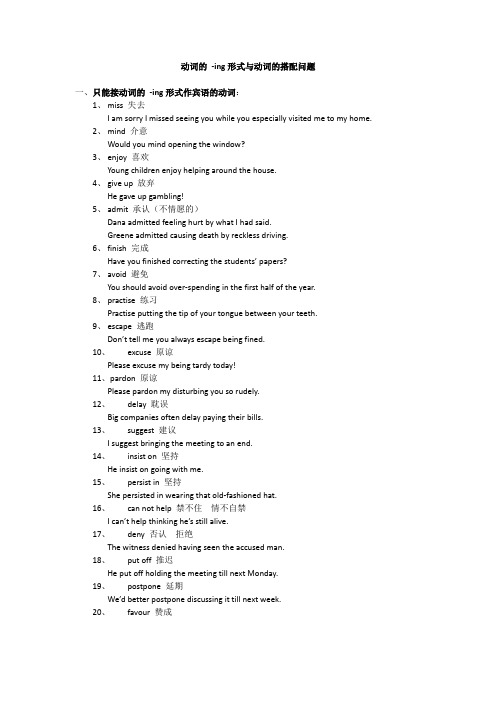
动词的-ing形式与动词的搭配问题一、只能接动词的-ing形式作宾语的动词:1、miss 失去I am sorry I missed seeing you while you especially visited me to my home.2、mind 介意Would you mind opening the window?3、enjoy 喜欢Young children enjoy helping around the house.4、give up 放弃He gave up gambling!5、admit 承认(不情愿的)Dana admitted feeling hurt by what I had said.Greene admitted causing death by reckless driving.6、finish 完成Have you finished correcting the students’ papers?7、avoid 避免You should avoid over-spending in the first half of the year.8、practise练习Practise putting the tip of your tongue between your teeth.9、escape 逃跑Don’t tell me you always escape being fined.10、excuse 原谅Please excuse my being tardy today!11、pardon 原谅Please pardon my disturbing you so rudely.12、delay 耽误Big companies often delay paying their bills.13、suggest 建议I suggest bringing the meeting to an end.14、insist on 坚持He insist on going with me.15、persist in 坚持She persisted in wearing that old-fashioned hat.16、can not help 禁不住情不自禁I can’t help thinking he’s still alive.17、deny 否认拒绝The witness denied having seen the accused man.18、put off 推迟He put off holding the meeting till next Monday.19、postpone 延期We’d better postpone discussing it till next week.20、favour赞成21、Understand 明白I can understand her wanting to live alone and be independent.22、Risk 冒险I can’t help wondering whether we should risk going without raincoats.23、Keep 保持News of successes keeps pouring in.24、Fancy 想象Sorry, but I don’t fancy going out tonight.25、Endure 容忍忍受The lazy bones didn’t fancy getting up at 4 o’clock every morning.26、Dislike 厌恶I dislike getting up early.27、Consider 考虑He was in low ebbs and considered going away.28、Anticipate期望预料We anticipate hearing from you again.29、Appreciate 感激I really appreciate your telling me that.30、Acknowledge 承认Mr. Smith acknowledged receiving the book.31、Imagine 想象I can’t imagine him knowing all that.32、Advocate 拥护主张He doesn’t advocate getting up too early.33、Facilitate 促进是便利Tape recorder facilitates studying English.34、Involve 包括House-keeping involves cooking, washing dishes, sweeping, and cleaning.35、Resent 厌恶He resented being asked to wait.36、Detest 厌恶She said she had always detested seeing a bull fight.37、Loathe 非常厌恶I’d rather go by sea, I loathe flying.38、Ensure 保证确保I can’t ensure his being there in time.39、Can’t resist 忍不住I can’t resist seeing chocolates.40、Resent 怨恨不快Does he resent my being here?41、Evade 逃避Evade paying taxes42、Mention 介意My wife didn’t mention my writing to my private secretary.43、Forbid 禁止The law forbids selling liquor to minors.44、Contemplate 打算注视I hope you would contemplate coming with us on the trip.45、Defer 暂缓延期They deferred making a decision.46、Recall 回忆记起I can’t recall having met him before.47、Approve 批准同意Exercise 1 Put the verbs in brackets into the correct forms, choosing between the –ing participle and the infinitive:1.He was in low spirits and even considered(go) away.2.The criminal even threatened (murder) the president.3.Practise (put) the tip of your tongue between your teeth and blowing: You will pronounceperfect th’s!4.You must endeavour __________ (explain) yourself more clearly, it is impossible _________(understand) what you are trying _________ (say).5.Bob contemplated _____________ (go) to Africa after graduation.6.I can’t help __________ (wonder) whether we should risk ________ (go) without raincoats.7.Don’t tell me you always escape __________ (be) fined because you have a very fast sportscar!8.Leave off ________ (bite) your nails.9.My mother detested ___________ (go) to classical concerts so I never learned ________(appreciate) classical music until I was old enough ___________ (start) a collection of records.10.He didn’t feel like _________ (work) so he suggested _________ (spend) the day in thegarden.11.You still have a lot _________ (learn) if you’ll forgive my ________ (say) so.12.Tim decided ___________ (put) broken glass on top of his wall ________ (prevent) boys________ (climb) over it.13.You certainly mustn’t miss ________ (see) this wonderful film.14.Do you recollect/recall ___________ (tell) John about the new house?15.The doctor advised ___________ (take) the car.16.I could not imagine that ________ (be) possible.二、即可接动词–ing形式,又可接动词不定式作宾语的动词:(一)接两种形式,意义无太大区别的动词如表示一般行为,用分词结构作宾语为多,如表示特定的活具体的动作,则用不定式作宾语为多。
动词ing的用法

keep on take up feel like
1.Isn't it time you got down to______ the papers? (2006重庆卷) A.mark B.be marked C.being marked D.marking 2. You can't imagine what difficulty we had ______ home in the snowstorm. (2007辽宁卷) A. walked B. walk C. to walk D. walking 3. —Can I smoke here? —Sorry. We don’t allow ______ here. (2007江苏卷) A. people smoking B. people smoke C. to smoke D. smoking 4.I can’t stand _____ with Jane in the same office. She just refuses______ talking while she works. (2006北京卷) A. working ; stopping B. to work ; stopping C. working ; to stop D. to work ; to stop 5. Having been ill in bed for nearly a month, he had a hard time ______ the exam. (福建2004) A. pass B. to pass C. passed D.passing
一、动词-ing形式作主语 (动名词)
① Teaching is my full-time job. ② Writing an English composition is not easy. [考点1] 动词-ing形式作主语表示 抽象或泛指动作
动词ing形式的用法

1. Using your head, you’ll find a good way.(条件)2. Four people entered the room looking around in a curious way.(伴随动作)3. Being poor, he couldn’t afford a TV set. (原因)4. Working hard, you’ll surely succeed.(条件)5. The boy sat in front of the farm-house, cutting the branch. (伴随)6. He came running back to tell me the news. (方式)7. (When) Hearing the news, he got frightened.= When he heard the news, he got frightened. (时间,分词前可保留when )8. The child slipped and fell, hitting his head against the door. (结果)9. The song is sung all over the country, making it the most popular song.-ing形式作状语时, 它的逻辑主语必须与主句的主语是一致的。
Time permitting, I will pay a visit to the whole city.(分词的逻辑主语是time , 而句子的主语是I , 两者不构成主谓关系, 所以只能用独立主格结构, 也就是给现在分词补充一个主语。
)I waiting for the bus, a bird fell on my heard.我等汽车时,一只鸟落到我头上。
All the tickets having been sold out, they went away disappointedly.所有的票已经卖光了,他们失望地离开了。
- 1、下载文档前请自行甄别文档内容的完整性,平台不提供额外的编辑、内容补充、找答案等附加服务。
- 2、"仅部分预览"的文档,不可在线预览部分如存在完整性等问题,可反馈申请退款(可完整预览的文档不适用该条件!)。
- 3、如文档侵犯您的权益,请联系客服反馈,我们会尽快为您处理(人工客服工作时间:9:00-18:30)。
4. She’s upstairs ___ letters. D A. writes B. is writing C. write D writing 5. The visiting Minister expressed his satisfaction with his talks,C that he __ had enjoyed his stay here. A. having added B. to add C. adding D. added
Compare: Did you notice a man enter the room just now? 你注意到有个人刚才进了屋子吗?
6)-ing分词作状语 (1)-ing分词在句中可以作伴随状语,常放于 句后,表示主语正在进行的另一个动作,来对 谓语表示的主要动作加以修饰或作主要陪衬。 如: They sat in front of the building, laughing and chatting. He worked late yesterday, preparing for the lecture. (2)-ing分词可以作时间状语,常放在句首, 如: (When)Walking in the street,I caught sight of a tailor's shop.
要点讲解
Make them easier for you to remember !
tips
practise envy
excuse
避免 错过 少延期 avoid miss put off/ postpone
建议 完成 多练习 suggest finish
喜欢 想像 禁不住 enjoy
imagine can’t help
试着做某事
3)--ing 分词作表语。如: Our job is playing all kinds of music. The music they are playing sounds so exciting.
注:一般来讲,--ing分词作表语有两种情况, 一是名词性,这时主语和表语可以互换。即: Playing all kinds of music is our job. 二是形容词性,表示主语的性质和特征, 主表不可互换。
A 1. ___ more attention, the tree could have grown better A. Given B.To give C. Giving D. Having given 2.___ a reply, he decided to write again. C A. Not receiving B. Receiving not C. Not having received D. Having not received 3.The secretary worked late into the night, B a ___ long speech for the president. A. to prepare B. preparing C. prepared D was preparing
5) 在see,hear,feel,watch,notice等感官动词后 可以用-ing形式做宾语补足语。这时-ing 形式 和句子的宾语之间存在着逻辑上的主谓关系, 并且-ing 形式表示宾语正在进行的动作。如: He saw a boy climbing the tree. Do you hear someone knocking at the door? 有人敲门你听见了吗?
4) -ing分词作定语可以表示 (1) 所修饰名词的用途。如: a waiting room(=a room for waiting) 候车室 a walking stick(=a stick for walking) 手杖 a sleeping car (= a car for sleeping) 卧车 (2)所修饰词的性质特征。如: exciting news 令人激动的消息 a moving story 一个令人感动的故事
承认 否定 与嫉妒 admit
逃避 冒险 莫原谅 escape
deny
risk
忍受 保持 不介意 stand
keep
mind
英语中某些及物动词后习惯跟动名词作宾语,这类动词 是:advise, delay, apprecfeel like etc.
to do sth.
(3)作状语 (须用普通名词或主格代词,亦称 独立主格结构) Time permitting, we’ll deal with the text. The boy was playing with a ball, his mother standing nearby. 典型错误: Reading in bed in my room, someone knocked at the door. 应改为: Reading in bed in my room, I heard someone knocking at the door. I reading in bed in my room, someone knocked at the door.
3. ---ing分词的被动式
当-ing 分词与它的逻辑主语构成被 动关系时,需要用被动形式。根据-ing 分词动作发生的时间,-ing分词的被动 式分为一般被动式(being done)和完成被 动式(having been done), 如: The question being discussed is very important. Having been praised by the teacher, he works even harder.
6.“ Can’t you read?” Mary said ___ to the notice. A A. angrily pointing B. and pointed angrily C. angrily pointed D. and angrily pointing
8. The computer center, ___ last year, is very D popular among the students in this school. A. open B. opening C. having opened D. opened
(After )Finishing my work, I went out. Having told us a funny story, the teacher went on to explain the text to us (3)-ing分词可以作原因状语,常放句首。 如: Being ill, he can't go to school. Not knowing her address, we couldn't get in touch with her. Having lived in the city for many years, he knows it very well.
1. –ing 分词的构成
主动形式 被动形式 doing being done 一般式 完成式 having done having been done 否定式: not+ --ing/not having(been) done 不是 having not (been) done
2. 一般式和完成式的用法
(2)作宾语(除了物主代词和名词所有格,也可用普 通名词或代词宾格) He was awakened by someone’s knocking at the door. They have never forgiven us going there. We don’t mind him explaining it again. My friend can’t understand your treating him like that.
(3)所修饰名词正在进行的动作,可以换成定语 从句形式。如: a sleeping child (=a child who is sleeping) 正睡觉的孩子 a walking man (= a man who is walking) 正散步的男人 注:分词短语作定语须放在所修饰词之后,例 如:the man standing at the gate=the man who is standing at the gate 另外,-ing分词的完成式不能作定语。例如 不可以说:The man having written many books is a former student of our school.应改为 The man who has written many books is…
forget regret 忘记去做某事
doing sth.
忘记已经做过某事 记住曾做过某事 后悔做过某事 意味着做某事
remember 记住去做某事
遗憾去做某事 打算/想做某事
mean
go on (做完某事)接着去 继续做同一件事 做另一件事 stop 停下来去做另一件事 停止做一件事 try
努力去做某事
4. ---ing分词的句法功能
1) ---ing 分词作主语 Learning English has become a part of his life. It is no use trying to repair the ship. These holes are much too big. 2) ---ing分词作宾语 以下动词必须跟---ing分词作宾语:admit/ appreciate/avoid/consider/delay/deny/dislike/enjoy /escape/excuse//fancy/finish/imagine/keep/mind/ miss/postpone/put off/practise/resist/risk/stand/ stop/ suggest/ give up/cannot help(禁不住)
